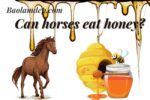Can horses eat honey? This question stirs curiosity among equine enthusiasts and horse owners. Let’s dive into the fascinating world of horse diets and explore the benefits and risks of feeding horses honey.
1. Can horses eat honey?
Yes, horses can eat honey. Honey is a natural product that is not toxic to horses, and it can be included in their diet in moderation. Horses are often fond of its sweet taste. Honey is also rich in antioxidants and can provide a quick energy source due to its high sugar content.
However, like any treat, it should be given sparingly and should not make up a large part of a horse’s diet. This is mainly because of its high sugar content. Overfeeding sugar can lead to obesity and other health problems in horses, such as insulin resistance or laminitis.
2. The benefits of honey for horses
- Energy source: Honey contains natural sugars and easily digestible carbohydrates, providing energy for horse activities and growth.
- Antibacterial properties: Honey has antimicrobial and anti-inflammatory properties, supporting the immune system and preventing infections.
- Antioxidant effects: Honey contains natural antioxidants that protect cells from damage caused by free radicals.
- Digestive support: Honey soothes and protects the digestive mucosa, improving digestion and nutrient absorption.
- Mineral absorption: Honey contains minerals such as potassium, calcium, and magnesium, which play a crucial role in electrolyte balance and muscle function in horses.
However, feeding honey to horses should be done cautiously and in appropriate amounts and frequencies. Special considerations should be taken for horses with conditions such as diabetes, lameness, or allergies to honey. Always consult with a veterinarian or equine nutritionist for specific guidance for your horse’s situation.
3. Are there Risks to Feeding Horses Honey?
While honey can provide some benefits, potential risks come with feeding it to horses:
- The Risk of Allergic Reactions
Though relatively rare, horses can have allergies, and new foods like honey can potentially trigger these allergies. Allergic reactions may manifest as skin irritations, changes in behavior, or digestive upset.
- The Risk of Overconsumption
Due to honey’s high sugar content, overconsumption could lead to obesity and related health issues in horses. It’s crucial to control the amount of honey a horse consumes to prevent these problems.
- The Risk of Botulism
One of the lesser-known risks of honey is its potential to carry botulism spores, especially raw honey. Botulism can cause severe neurological issues in horses and can be fatal in extreme cases.

4. Dealing with Potential Risks of Honey for Horses
When it comes to feeding honey to horses, it’s crucial to be aware of the potential risks and understand how to manage them effectively. Here are some guidelines on dealing with these risks:
Identifying and Managing Allergic Reactions
Allergic reactions in horses can manifest in various ways, such as skin irritations, changes in behavior, or digestive upset. If you notice any of these symptoms after introducing honey into your horse’s diet, stop feeding it immediately and consult with a veterinarian. To confirm if honey is causing the reaction, the vet may recommend an exclusion diet, where you stop feeding the horse honey and observe whether the symptoms subside.
Preventing Overconsumption
Honey is high in sugar, and overconsumption can lead to obesity and related health issues in horses. Therefore, it’s important to moderate the amount of honey you feed your horse. Honey should not replace a horse’s regular diet but rather be used as a small addition to their overall feeding plan.
If your horse develops a particular liking for honey, it might be tempting to overfeed it. Resist this temptation and stick to the recommended amount, usually a few tablespoons per day at most, and not every day.
Managing the Risk of Botulism
Raw honey can carry botulism spores, which can cause severe health problems in horses. To minimize this risk, consider using processed honey instead, as the processing often kills botulism spores.
Even then, it’s essential to observe your horse for signs of botulism, which may include weakness, difficulty chewing or swallowing, or paralysis. If you suspect botulism, seek immediate veterinary attention, as this is a potentially life-threatening condition.
Regular Check-ups
Regular veterinary check-ups are crucial to ensure that the introduction of honey into your horse’s diet hasn’t adversely affected their health. Vets can perform blood tests and other diagnostic procedures to monitor the horse’s health closely.
5. How to Feed Honey to Horses?
Feeding honey to horses isn’t as simple as adding a dollop into their feed. It’s essential to consider the amount, frequency, and type of honey, as well as the horse’s health status. Here’s how you can safely incorporate honey into your horse’s diet, along with some expert tips:
- Consult with a Veterinarian
Before introducing honey to your horse’s diet, always consult with a veterinarian or equine nutritionist. They can provide valuable advice based on the horse’s specific health conditions and dietary needs.
- Start with Small Amounts
When starting, add a small amount of honey to your horse’s feed – a teaspoon is a good starting point. This allows your horse to get used to the new addition and lets you monitor any adverse reactions.
- Gradually Increase the Quantity
If your horse responds well, you can gradually increase the quantity over time. But remember, honey should never be a significant part of a horse’s diet. A few tablespoons per day is usually more than enough.
- Use Honey as a Treat
Honey can also be used as a treat or reward for good behavior. You can use a small dollop of honey to disguise a medication’s taste or encourage a picky eater.
- Choose the Right Type of Honey
Avoid raw honey, which might contain harmful botulism spores. Opt for processed honey instead. Additionally, some experts suggest using local honey, which may help horses deal with local allergens.
6. FAQs About Horses and Honey
Can all breeds of horses eat honey?
Most breeds can consume honey, but reactions may vary based on individual health conditions and tolerance.
How much honey should a horse eat?
The quantity should be determined in consultation with a veterinarian, but as a rule, it should be a small part of the diet.
What should I do if my horse has a negative reaction to honey?
Stop feeding honey immediately and consult your veterinarian.
In conclusion, horses can indeed eat honey, but it must be done responsibly. The sweet taste of honey can be a delightful treat for horses, and it can provide some health benefits due to its antioxidant properties. However, due to its high sugar content, honey should be given in moderation to avoid health complications. Remember, every horse is unique and may respond differently to dietary changes. Always consult with a veterinarian before introducing new foods like honey into your horse’s diet. Regular monitoring and professional guidance can ensure a balanced diet that keeps your horse happy and healthy. We hope the article “can horses eat honey” on Baolamdep.com provides you with valuable information.

